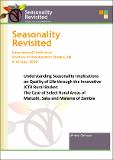| dc.contributor.author | Chibuye, Miniva | |
| dc.date.accessioned | 2021-01-15T08:59:12Z | |
| dc.date.available | 2021-01-15T08:59:12Z | |
| dc.date.issued | 2009 | |
| dc.identifier.citation | Chibuye, M. (2009). Understanding Seasonality Implications on Quality of Life through the Innovative JCTR Rural Basket: The Case of Select Rural Areas of Matushi, Saka and Malama of Zambia. Lusaka, Zambia: Jesuit Centre for Theological Reflection (JCTR). | en |
| dc.identifier.uri | https://repository.jctr.org.zm/handle/20.500.14274/221 | |
| dc.description | Zambia is one of the poorest countries in the world with 64% of its people living below the poverty threshold and about 51% living in extreme poverty1 measured by failure to meet the minimum required basic food items. This conference offers a good platform to strengthen the assertion that paying attention to all elements affecting food security is a starting point to devising sustainable ways of dealing with hunger. The Rural Basket is a powerful monitoring tool for access to food in rural areas as it measures household food consumption. It provides a genuine and comprehensive measure of the scale of extreme and overall poverty in select rural areas in Zambia. Furthermore, it is an indicator of the success or failure of different policies in alleviating poverty. | en |
| dc.description.abstract | The causes of poverty and required responses is a call for concern in Zambia. A study done by the WHO in 2008 revealed that Zambia was among the ten most malnourished countries in the world. The dominant factors that hinders Zambia’s response to the problem of poverty and food security especially in rural areas is the lack of regular national statistics to inform timely action. One of the ways through which seasonality and its implications on quality of life can be deeply understood, monitored, and upon which accurate interventions can be properly designed to improve quality of life is the JCTR’s initiative of the Rural Basket. The research was conducted in three rural districts in Zambia: Saka area in Masaiti District (Copperbelt Province), Malama area in Mambwe District (Eastern Province) and Matushi area in Mufumbwe District (North-Western Province). The Rural Basket research is conducted on a monthly basis from randomly selected households using a recall method. Local researchers were used to ensure regularity in data collection. This paper largely focused on the food security section though reference to other sections was also made. It was revealed that food security is a vexing problem for most households. Even where some food is available for certain duration in the year, especially the immediate post-harvest period, the diet is very narrow to assure good nutrition for households, particularly children. It was also found that availability of food is generally influenced by the rainy season, a sign of rain dependent agriculture. Furthermore, rural areas in Zambia are not well endowed with preservation methods as fresh vegetables and tubers are depleted by June. Evidence so far indicates that rural areas in general terms exist in a state of vulnerability observed through both income and food insecurity. | en |
| dc.language.iso | en | en |
| dc.publisher | Jesuit Centre for Theological Reflection | en |
| dc.rights | Attribution-NonCommercial-ShareAlike 3.0 United States | * |
| dc.rights.uri | http://creativecommons.org/licenses/by-nc-sa/3.0/us/ | * |
| dc.subject | Poverty | en |
| dc.subject | Rural Basket | en |
| dc.subject | Basic Needs Basket | en |
| dc.title | Understanding Seasonality Implications on Quality of Life Through The Innovative JCTR Rural Basket: The Case of Select Rural Areas of Matushi, Saka And Malama of Zambia | en |
| dc.title.alternative | Seasonality revisited: International Conference | en |
| dc.title.alternative | Seasonality revisited: Perspectives on Seasonal Poverty | en |
| dc.type | Case Study | en |

